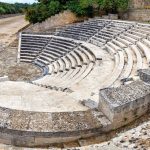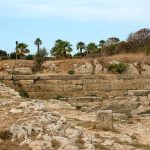
The Odeon of Rhodes: Music, Rhetoric, and the Art of Sound
May 24, 2025
The View from Monte Smith: Light, Memory, and the Soul of Rhodes
June 1, 2025Table of Contents
A City that Spoke in Harmony
In the Hellenistic age, Rhodes wasn’t just a maritime power — it was a city that spoke. Its people believed that words could build laws, persuade enemies, and even move the gods. The rhetoric schools of Rhodes became the beating heart of this idea, attracting students from every shore of the Mediterranean.
Here, eloquence wasn’t a luxury or a performance trick. It was the language of democracy and the mark of a civilized mind. Young men trained in sun-lit courtyards and marble halls, their voices echoing through the Odeon and gymnasium. To speak clearly was to think clearly; to think clearly was to live rightly. That was the Rhodian creed.
A Harbour for Learning

No city was better built for study. The Acropolis of Rhodes rose above the sea like a living campus — temples gleaming on the heights, gymnasia and libraries spread across the terraces. Philosophy met sport; music met mathematics; and in the middle of it all stood the Odeon, where orators tested the reach of their voices.
By the 2nd century BC, the island was called the “university of the Aegean.” Students came from far and wide — Greeks, Egyptians, even Romans — drawn not only to technique but to the moral discipline behind it. The rhetoric schools of Rhodes aimed to shape citizens who could reason, persuade, and act with integrity. Knowledge meant nothing unless it served justice.
How the Rhodians Taught the Art of Speech
A Rhodian education started with the basics: grammar, logic, and structure. From there, it moved into philosophy, ethics, and the fine art of persuasion. Students learned to build arguments, to balance emotion with fact, to hold a room’s attention through rhythm and tone.
But the teachers demanded more than clever phrasing. They wanted character. Words without virtue were empty noise. The students were told to marry logos (reason) with ethos (moral character) and pathos (emotion) — three threads that, woven together, made true eloquence.
Lessons often took place outdoors. The sound of the sea trained the ear; the open air tested the lungs. In the Odeon, voices were measured against the acoustics — a real test of clarity and courage. Poetry and music filled the gaps between speeches, teaching rhythm and balance. Every exercise was as much about harmony as about persuasion.
The Masters and Their Pupils

The rhetoric schools of Rhodes were led by teachers whose influence spread across centuries. Many had studied in Aristotle’s Lyceum and brought to Rhodes his spirit of inquiry and reason. They taught by dialogue and example rather than by dictation.
Their most famous pupil, Cicero, later called Rhodes the place where he “found his voice.” Under Rhodian guidance, he learned the art of moderation — how to be passionate without losing control, logical without losing warmth. It was this balance, this calm strength, that made Rhodian oratory legendary.
Mentorship here was personal. Teachers didn’t just correct speech; they shaped souls. To speak well, they said, you must first live well. Learning rhetoric in Rhodes meant learning how to think, to choose, and to act.
Words as the Foundation of Civic Life

In Rhodes, speech wasn’t confined to lecture halls — it was the bloodstream of the city. Assemblies, courts, and diplomatic missions all depended on citizens trained in reasoned debate. The rhetoric schools of Rhodes prepared them not just to speak, but to serve.
Every public discussion was treated as sacred, a reflection of the harmony believed to govern both the cosmos and the state. The Odeon itself became a kind of temple, where human voices sought to mirror divine order. To hear a Rhodian orator was to feel logic and emotion move as one — like a melody of justice.
Through eloquence, the Rhodians built their democracy and guarded their peace. They proved that power expressed through words could outlast empires built on force.
The Legacy of a Speaking City
Today, the terraces of the Acropolis are quiet, yet the air still seems to remember those voices. The rhetoric schools of Rhodes turned persuasion into a moral art, teaching that true speech begins in understanding and ends in harmony.
Even in ruins, the city whispers its old truth: that language, when guided by reason and character, can change the world. For the Rhodians, eloquence was not vanity — it was virtue made audible, wisdom turned to sound.


